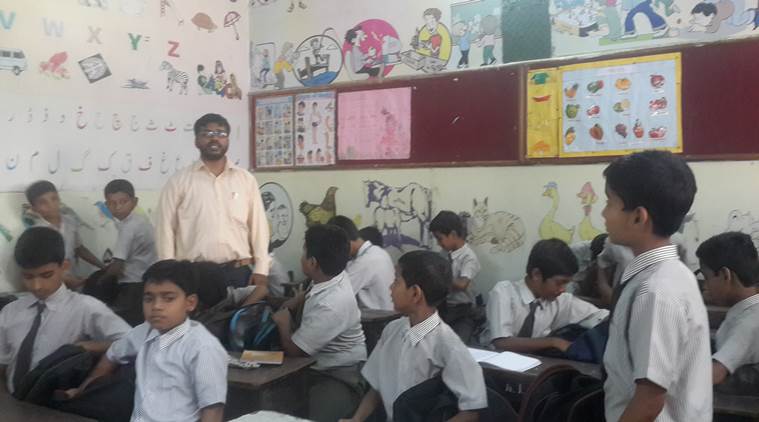AT the Jan Mohammed Kasam High School gates, the security guard takes a few minutes to recognise him before allowing him access. On August 2006, Wahid Shaikh, a 27-year-old English teacher, was pulled out of a classroom by the Mumbai Police as a suspect in the Mumbai train blasts. Nine years later, Shaikh was back to the premises Monday, as assistant teacher. Shaikh is the lone acquittal in the 7/11 serial train bombings
The three-storey school with 11 teachers and 350 students is a landmark in the Muslim neighbourhood of Grant Road with a monthly school fee of less than Rs 40. On Day One, Shaikh taught three subjects, his enthusiasm on many occasions competing with that of the students. Within half an hour of entering the school gates, and completing official paper work, Shaikh, now 36, saw himself in front of a blackboard.

His first task was to teach spoken English to 40 students. Most of them, he said, hailed from the slum colonies adjacent Grant Road station.
 Having spent years in dark environs, Shaikh’s first reaction in between class hours when he sees a student weeping after a fall is to hug him. (Source: Express photo)
Having spent years in dark environs, Shaikh’s first reaction in between class hours when he sees a student weeping after a fall is to hug him. (Source: Express photo)
As he gave detailed instructions, he chose to engage students in a play called “Find the location”, where students are made to spread themselves in the classroom and give their location by describing the nearest object.
[related-post]
“It helps them get over fear of speaking English,” explained Wahid as he helped students identify objects in English. “It was more of play than a class,” he said as he goaded and corrects students to get location right.
Shaikh stated that his priority is to hit the ground running. He said his enthusiasm was “necessary” as the school dealt with children from marginalised sections, and it involved a school with minimum infrastructure.
Many students, not more than 10 years old, were taken by surprise seeing a new face.
“I don’t know who he is. I am seeing him for the first time. He looks strict but his class was fun,” said Mohammed Samad, one of the Class V students.
Story continues below this ad
Shaikh’s anxiety sometimes showed. A month since his release from prison, he has been facing hurdles adjusting to life. Inside the classroom too, he let down his guard a few times as he expressed that he had a new bunch of children from a “new world” and a syllabus which had changed a few times.
“The students I taught a decade back have now turned graduates. The syllabus has changed. The quality of students have changed. This bunch is more savvy with technology but not in the way that will help them in the long run,” he cautioned.
Having spent years in dark environs, Shaikh’s first reaction in between class hours when he sees a student weeping after a fall is to hug him. He said he would take days to know them and understand the situations and spaces they come from.
The first question Shaikh asked the students once he walked in and introduced himself was to understand their daily schedule and the time they hit bed. With most looking drowsy or in a state of fatigue, he said it was difficult to believe this was a morning school.
Story continues below this ad
“Almost half the students said they slept after midnight. Some slept after 4. All are hooked on to internet and busy playing games on mobile phones. This was not the case a decade back,” Shaikh said.
Apart from cultural shock, Shaikh had to make his way through a bureaucratic quagmire to reclaim his salary dues after being suspended following his arrest. Soon after his arrest, Wahid was suspended as per existing government rules. The government rules state that an individual facing charges is entitled to salary. He can, however, be paid his dues if acquitted. The Anjuman-I-Islam Trust, which runs the school, decided to reinstate Shaikh after he approached them and provided them documents of his acquittal.
“We reinstated him as per rules laid down by the state government,” a member of the Trust said.
His fellow teachers, many of whom were present when he was picked up by the police, claimed they always vouched for his innocence and were happy to see him back.
Story continues below this ad
“Almost everyone here in school knew that he was innocent. The school had even held a prayer for him on the day of the judgment. It looks like our prayers got answered,” said a fellow teacher.
Wahid said many former students were surprised to find him embroiled in the case.
“During one of my hearings in court, one individual came upto me and asked me whether I recognised him. It turned out that he was my student from the same school and was studying law. He broke down when I told him why I was in court,” said Wahid.
The day grew, so did Shaikh’s involvement in classrooms. While English was taught through games, he spent a good time teaching science to an excited bunch as he tried to make things simple. By afternoon, he doubled up as history teacher. As the class progressed, he narrated stories of Mahajanapada, an oligarchic kingdom in India in the sixth century BC. “It was a lesson on an ancient kingdom that once existed in India,” he said between classes.

 The acquitted in 7/11 Mumbai serial trainblasts case, Wahid Shaikh.
The acquitted in 7/11 Mumbai serial trainblasts case, Wahid Shaikh.
 Having spent years in dark environs, Shaikh’s first reaction in between class hours when he sees a student weeping after a fall is to hug him. (Source: Express photo)
Having spent years in dark environs, Shaikh’s first reaction in between class hours when he sees a student weeping after a fall is to hug him. (Source: Express photo)





